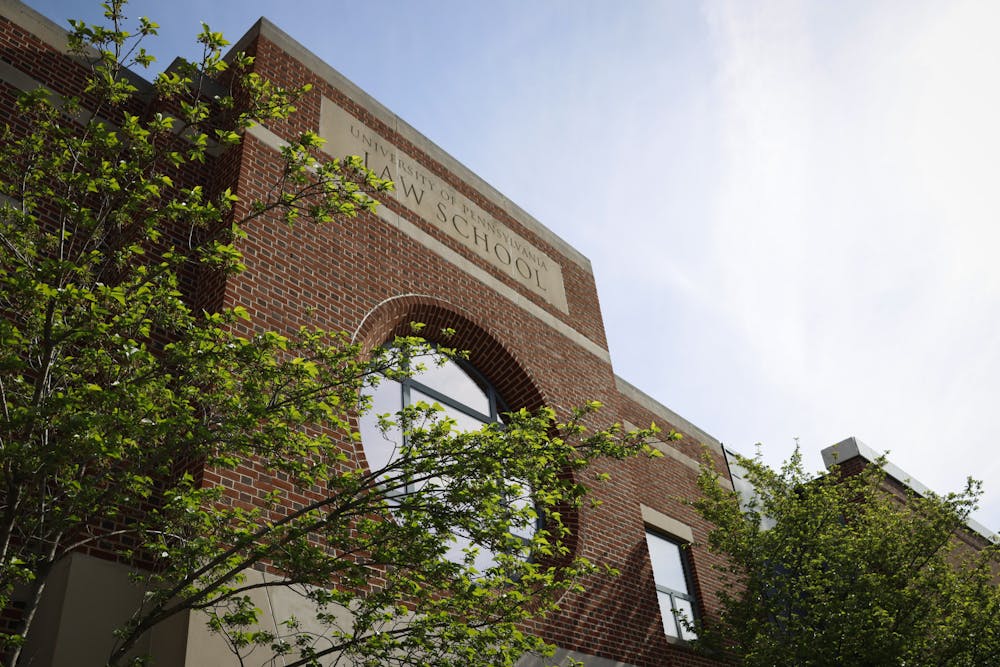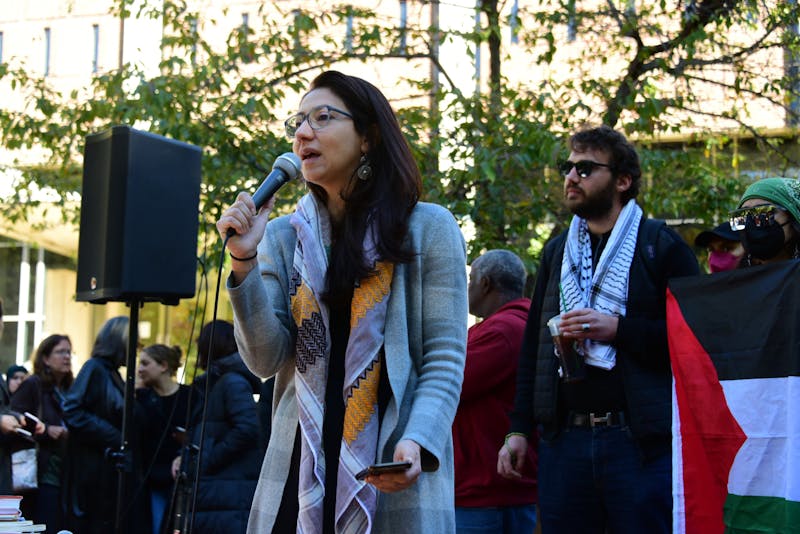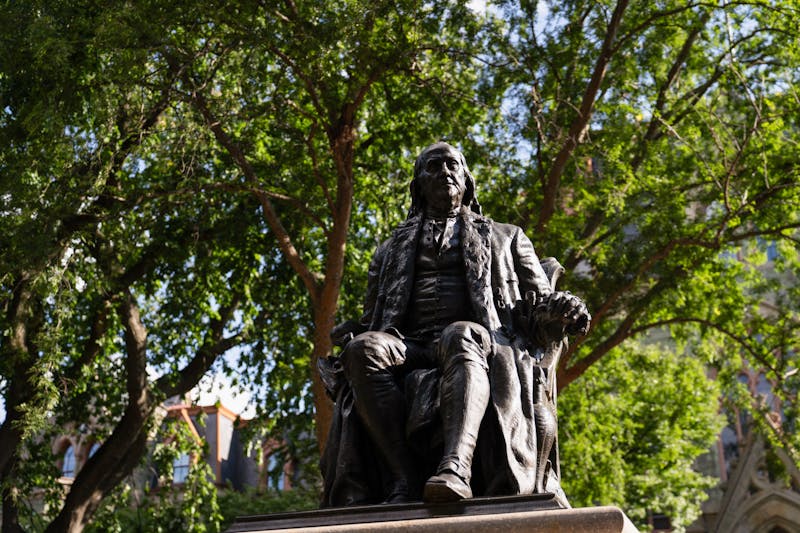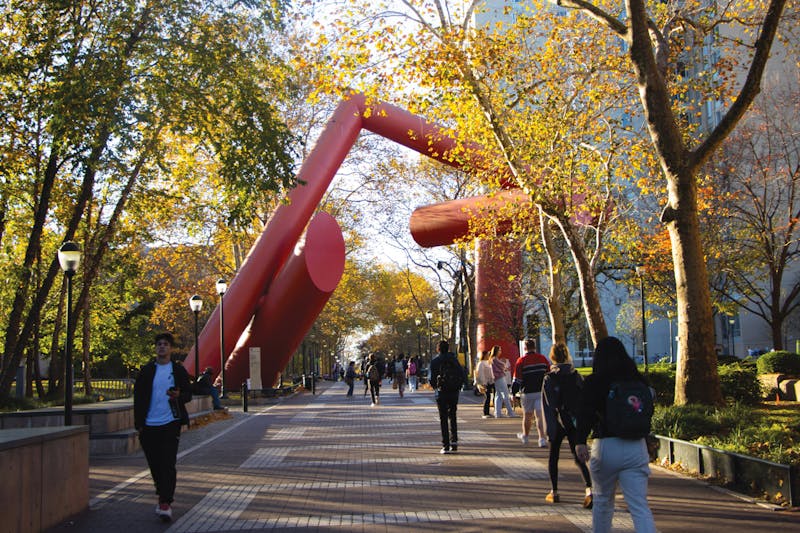
The University of Pennsylvania Carey Law School is located at 3501 Sansom Street.
Credit: Abhiram JuvvadiThe University's historic sanctioning of University of Pennsylvania Carey Law School professor Amy Wax this week has invited a wave of reactions on campus and nationwide — with many applauding a long–awaited response to Wax's controversial comments, and others apprehensive about the decision's implications for free speech.
Wax’s sanctions are wide–ranging, including a one–year suspension at half pay that goes into effect next fall, and the removal of her named chair, which is now reflected on her faculty website. Penn also eliminated her summer pay and instituted a requirement that Wax note in public appearances that she is not speaking on behalf of or as a member of Penn Carey Law.
The rare decision to punish a tenured faculty member — the first such occurrence under Faculty Senate processes in at least 20 years — has invited commentary among students, faculty, and administrators.
Penn Carey Law Dean Sophia Lee addressed the outcome of the years–long disciplinary proceedings in an email on Tuesday, after the sanctions became public. She called the sanctions process, which was observed by academic freedom advocates, "thorough, deliberative, and faculty driven."
"Faculty, not administrators, acting through their selected bodies and procedures, are best positioned to ensure that institutional censure of faculty respects the bounds of academic freedom," Lee wrote.
But — in a sign of the University's longstanding reluctance to discuss the Wax case publicly — Lee also cited Penn's recent move to limit statements on local and world events. Eric Feldman, a professor of law and chair of the Faculty Senate, told The Daily Pennsylvanian that the sanctions arose as the outcome of “faculty driven process” and required “a significant amount of faculty time and thought.”
Feldman did not serve on the hearing committee that examined Wax's case.
Third–year law student and Penn Carey Law Council of Student Representatives President Alexander Diwan, who clarified that he was speaking on behalf of himself and not the Council, described Wax's suspension as a “step in the right direction.”
He wrote that freedom of academic discourse is “extremely important” and that academic institutions need to “approach any decision to censure a faculty member for their speech in a deliberative and rigorous manner,” which he believes the University did through its hearing and appeals process.
“Professor Wax's racist comments threw her ability to fairly assess her students into question and undermined core values that should be dear to any educational institution: namely, the inclusion and acceptance of all students regardless of their identity,” Diwan wrote.
Others echoed that assessment, including members of Penn's Black Law Students Association, which called the sanctions an “overdue step" but “far from sufficient." The group called on the administration to fire Wax and ban white nationalist Jared Taylor — who has spoken in Wax’s classes multiple times, and plans to visit Penn this fall — from campus.
“For years, Wax has used her tenured position, as well as her Conservative (and Political Legal) Thought seminar to push a racist, white supremacist agenda in a higher academia setting, creating a hostile environment detrimental to minority students’ academic experience at this institution,” the group wrote.
The group also called on Penn Carey Law to take "unwavering action to live up to its stated commitments and ensure that this institution is a place where all students can thrive without fear of discrimination or bigotry.”
Lauren O’Garro Moore, a 2012 Penn Carey Law graduate who testified to a panel of faculty in May 2023 on her experiences with Wax, wrote to the DP that she was “relieved” to learn of the sanctions. In her testimony, Moore — who is Black — alleged that the controversial professor told her that she only has two Ivy League degrees “because of affirmative action."
“Testifying was tough business; reliving our initial interaction was not easy and, frankly, downright painful at times,” O’Garro Moore wrote. “Sitting at the same table as the person who clearly thought so little of me and those who look like me was unpleasant — but I'd do it all over again if I had to.”
Joe Cohn, the policy director at Heterodox Academy and former policy director at the Foundation for Individual Rights and Expression, condemned the decision to sanction Wax. He said that the decision will have “national implications” and may create a chilling effect on free speech among Penn faculty.
Cohn, a 2004 graduate of Penn Carey Law School and the Fels Institute of Government Administration, acknowledged that there is “little doubt” that Wax’s comments are offensive to many community members. Nonetheless, he said it is “incredibly disappointing to see the University of Pennsylvania set aside core principles of academic freedom” to sanction Wax.
He added said that faculty's ability to "research, teach and make the political arguments that they want” is key to upholding academic freedom. He criticized Penn Carey Law for failing to uphold these principles, adding that the school "should be training their students to argue against ideas that they find uncompelling.”
“[T]he message has been sent that they need to shut their mouths or they can be involved in two years of fighting for their careers,” Cohn said.
Harun Küçük, a Penn professor and former director of the Middle East Center, told the DP that the sanctioning of Wax may create “certain room for maneuver that might be scary for some faculty members, and some students.”
“If you can sanction somebody, that means you can also sanction somebody else,” Küçük added. “I don't think it's the case that they will just use this as a precedent to go after other people, but there is now less reason than ever not to go after other people.”
An initial report that was apparently leaked to the Washington Free Beacon this summer revealed that the hearing board decided to evaluate punishment for Wax on the basis of “flagrant unprofessional conduct by a faculty member,” seeking to differentiate the case from one revolving around University free speech protections.
Both Cohn and Küçük told the DP that they did not find that distinction to be clear, nor compelling.
“It's an unpersuasive distinction. They're deciding that arguments that they don't like are unprofessional,” Cohn said. “That's still viewpoint based…and their arguments to the contrary are just circular.”
Graduate School of Education professor Jonathan Zimmerman said he was concerned by the hearing board’s reference to “statements inside and outside the classroom” in its decision.
“I don't believe she has the right to say anything she wants inside the classroom, because there she has a duty as a teacher,” Zimmerman said. “But outside the classroom, she does, and we shouldn't be restricting what she says outside the classroom in any way.”
If the statements Wax allegedly made in the classroom were reported correctly, Zimmerman said “they do deserve a sanction,” but he was not confident they deserve a year of suspension with no pay.
In a statement to the DP, the Penn Alumni Free Speech Alliance wrote "the sanctioning of Professor Amy Wax privileges the psychological comfort of campus community members above academic freedom." It described a "failure to articulate a clear standard" for disciplining Wax.
In a blog post Wednesday, FIRE Vice President of Advocacy Alex Morey wrote that the decision to sanction Wax “calls tenure protections at private universities into question.”
“Penn’s dubious procedural efforts — which stripped Wax of many of the due process protections tenure affords — paid off,” Morey wrote. “If that’s all it takes to sidestep tenure, the rights of even the most protected private college faculty are tenuous at best.”
Wax told the New York Sun that she will remain at Penn despite the sanctions. She told the Sun that she will continue to strive to offer students “opinions and viewpoints they don’t want to hear.”
The Daily Pennsylvanian is an independent, student-run newspaper. Please consider making a donation to support the coverage that shapes the University. Your generosity ensures a future of strong journalism at Penn.
Donate











